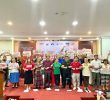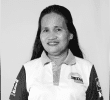THE VILLAGERS told the fact-finding team that soldiers arrived in October in Caatihan and slept in the tribal center and the gym. Kelly Delgado, secretary-general Karapatan in Southern Mindanao, said that soldiers are not allowed to use civilian structures like schools and gyms under the law.
Section 22, paragraph e of Article 10 of Republic Act 7610, also known as the Child Protection Act, states that “public infrastructure such as schools, hospitals and rural health units shall not be utilized for military purposes such as command posts, barracks, detachments, and supply depots.”
Article 12 part IV of the Comprehensive Agreement on Respect for Human Rights and International Law (Carhril) also states that “population shall have the right to be protected against the risks and dangers posed by the presence of military camps in urban centers and other populated areas.”
On their way back to Davao City on October 24, EJP delegates reported seeing soldiers in the gym of barangay Sta. Filomena in Cateel town. Some of the soldiers were on their hammocks. Military uniforms were also hung in a makeshift wire in the gym.

Delegates of Exodus for Justice and Peace took this picture of soldiers on their hammocks inside the gym in barangay Sta. Filomena in Cateel town, Davao Oriental. The International Humanitarian Law prohibits soldiers from using civilian structures as camps or sleeping ground. (davaotoday.com photo)
Karapatan said that what took place in Boston town is also taking place in other communities in Southern Mindanao where military operations resulted to human rights abuses against civilians. In a November 6 forum, the EJP reported that lumads (indigenous peoples) and farmers in other areas also experience harassment by soldiers. They included the Mandayas and Mansaka tribes in Taytayan, New Bataan; the D’babawons in Monkayo, Compostela Valley; the Obo-klatas in sitio Kahusayan in Tamayong, Davao City; and the Bagobos in Sta.Cruz, Davao Del Sur.
“Soldiers usually target civilians every time they are defeated by the NPAs,” Delgado said.
The NPA launched a series of attacks against the AFP along the borders of Surigao del Sur and Davao Oriental in September this year.
On September 22, the NPA attacked an AFP detachment in Lingig, Surigao del Sur. Two days after, the rebels launched another offensive against the soldiers in the same town. The last encounter occurred on September 30 in Barangay Simulao in Boston.
According to the NPA, 19 soldiers were killed and 20 were wounded during these attacks. But the AFP said only three soldiers were killed and 14 were wounded against the eight NPAs killed during the attacks.
Since the Eastern Mindanao Command (EastMinCom) was set up in the region in 2006, the EJP observed an increasing incidence of human rights violation. EastMinCom, which consists of at least six brigades and 15 battalions and special forces, operates in the entire Southern Mindanao, where Karapatan reported 60 cases of human rights violations from January- August, this year alone.
Delgado said the cases affected 699 families or 4, 042 individuals. The human rights group also reported 351 children victims of human rights violation for the period.
Pastor Jurie Jaime, EJP convenor, said the deployment of soldiers is part of the Oplan Bantay Laya 2 anti-insurgency campaign of the government which aims to wipe out the 40-year-old Communist insurgency. But instead of going after the rebels, they’re targeting civilians and legal activists.
EJP also said that the AFP troops in Davao Oriental have also been protecting the interests of the American-Australian owned Omega Gold and the paper company Paper Industries Corporation of the Philippines (PICOP). (Grace S. Uddin/ davaotoday.com)










